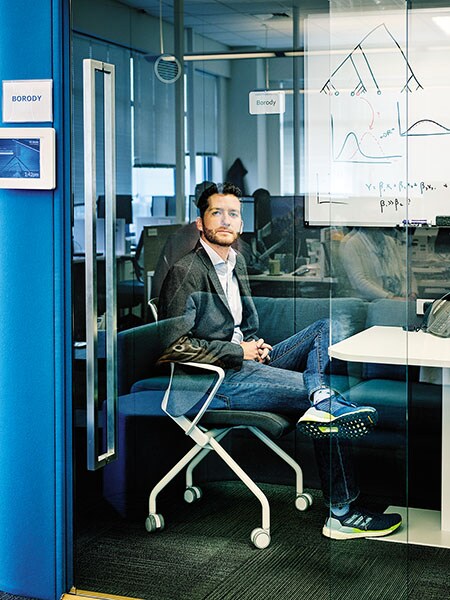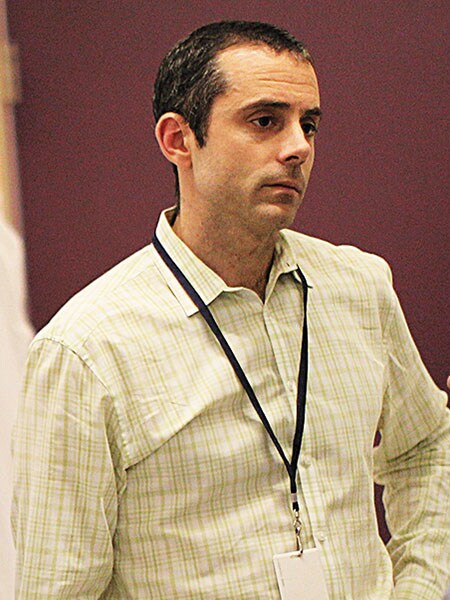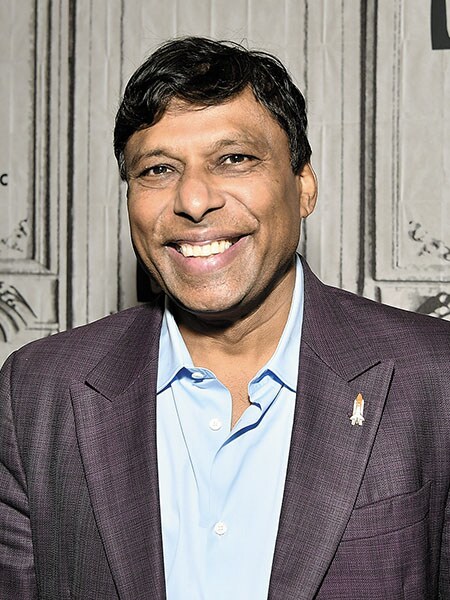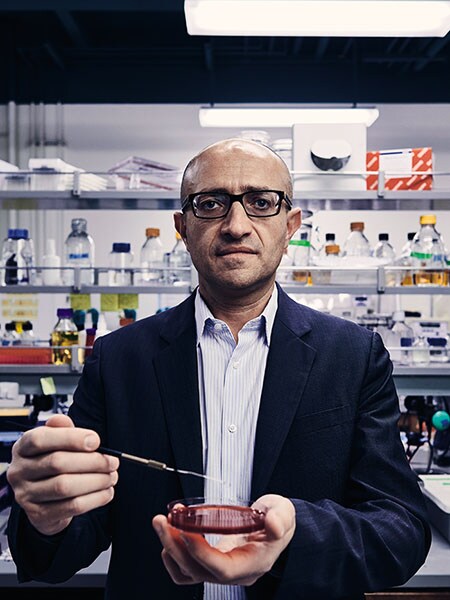Sharp pains shot through the patient’s stomach, and he had constant diarrhea. Seven rounds of antibiotics over 18 months had only made him feel worse.
A previously healthy man in his 20s who wishes to remain anonymous, he had contracted a recurring case of Clostridium difficile, or C. diff, after having his gallbladder removed in 2012. Hospital patients are prone to C. diff since antibiotic treatment for other maladies decimates the infection-fighting capacity of what scientists call the gut microbiome, the trillions of cells that move through the human digestive system. “It didn’t just affect my gut,” he says. “I was exhausted all the time. I had really bad brain fog. I couldn’t concentrate.”
Desperate, he researched possible therapies and discovered articles about faecal transplants wiping out the infection. But his gastroenterologist refused to perform the procedure. So he took matters into his own hands. He asked his roommate to supply a stool sample, bought an enema kit from CVS, pulsed the mixture in a blender, strained it through a coffee filter and pumped it into his gut. As though a wizard had cast a spell, he made a full recovery within days.
Welcome to the most promising new frontier in medicine: Poop. By focusing on what’s coming out of patients’ rear ends, a growing body of scientific research over the last 15 years has highlighted the crucial role the microbiome plays in human health. That new understanding could lead to breakthrough treatments for a huge range of illnesses, from obvious ones like digestive ailments and food allergies to surprising ones like cancer and autism. A microbiome-derived drug is already in the works to prevent childhood asthma.
Put crudely, the idea is to use gut bugs as drugs. More than 50,000 scientific papers in the last five years have explored the microbiome’s effects. Various kinds of gut bacteria appear to stimulate or suppress immune responses in the body, while others seem to fight off disease-causing microbes. A groundswell of cutting-edge research has the potential to deliver a burst of new therapies that will vastly reduce human suffering—and generate huge paydays for the field’s pioneers.
When scientists transferred gut microbiome cells from obese mice into lean ones, the recipients gained weight. In one study, melanoma patients with the most diverse microbiomes had the best response to immunotherapy. And mice injected with gut bacteria from marathon runners ran longer distances. A new drug for obesity alone could be worth more than $20 billion.
So far, the most compelling microbiome-derived therapy is a live faecal transplant for C. diff, which strikes half a million Americans annually, killing 15,000. In 2013, the New England Journal of Medicine published a paper that caught the scientific community by surprise and jump-started investment in microbiome drug development. In a randomised trial, 94 percent of recurrent C. diff patients recovered after receiving faecal transplants. To put that in context, cancer drugs with efficacy rates as low as 10 percent have been approved by the FDA.
Billions of dollars are pouring into microbiome medicine. Gbola Amusa, a medical doctor and partner at Chardan, a health care-focused investment bank in New York, pegs the total amount invested since 2014 at more than $5 billion. Techie billionaires including Bill Gates, Salesforce founder Marc Benioff and Silicon Valley venture capitalist Vinod Khosla are funding microbiome startups, and Gates, Benioff and Mark Zuckerberg have all made donations to support microbiome research at institutions including Stanford, Washington University in St. Louis and the University of California, San Francisco.![bernat olle bernat olle]() Bernat Olle co-founded Vedanta Biosciences, which has raised $112 million in funding
Bernat Olle co-founded Vedanta Biosciences, which has raised $112 million in funding
Image: Suzanne Kreiter / The Boston Globe Via Getty Images
The race is on for FDA approval of the first drug made from gut bacteria. But the science is young and unproven. At Oppenheimer in New York, Mark Breidenbach says investor enthusiasm in microbiome companies is on a downswing because “there is no consensus about what the microbiome can do”. Amusa is more bullish. “The science is turning,” he says. “When it comes through with proof, these biotech companies will be worth not hundreds of millions of dollars, but billions.”
Somerville, Massachusetts-based Finch Therapeutics is one of the most promising startups developing microbiome drugs. Co-founder Mark Smith, 33, was a microbiology grad student at MIT when the 20-something C. diff patient begged him for help. “I had to tell him, I’m a microbiologist, not a doctor,” Smith says.
The patient’s ordeal motivated Smith to create OpenBiome, the equivalent of a public blood bank for human faeces, while Smith was still at MIT in 2013. The Cambridge, Massachusetts, non-profit, the first of its kind in the world, has since supplied stool for more than 53,000 transplants in 1,200 hospitals and clinics.
Inspired by the demand for transplants, Smith co-founded for-profit Finch (named for the diverse group of finches Charles Darwin discovered in the Galápagos Islands) in 2016 to develop an FDA-approved C. diff pill. Currently, most doctors perform faecal transplants through a colonoscopy, which can cost as much as $5,000. The procedure is not FDA-approved or reliably covered by insurance.
Smith and his 80 employees occupy two floors in an industrial park that formerly housed administrative offices and storage space for the Harvard Art Museums. Tall and slender with piercing blue eyes, he welcomes the inevitable jokes that come with being a human-faeces entrepreneur. On Halloween he wore a poop-emoji costume (“I was a pooper trooper”) to the office, where the copiers have names like Squatty Potty and Magic Stool Bus. But he has raised serious capital. Venture funds have put in $130 million, and Finch has a partnership with Tokyo-based pharma giant Takeda to develop drugs for ulcerative colitis and Crohn’s disease, which together have 10 million sufferers worldwide. Finch is also working on an autism drug.
Traditionally, scientists start with data gathered through experiments on mice. Finch is taking a “human-first” approach, skipping the rodents and analysing the stool of human patients who have recovered after receiving faecal transplants. “We’re looking at what works in patients and figuring out how to make our drugs from the top down,” Smith says. “It’s called reverse translation.”![naveen jain naveen jain]() Naveen Jain’s Viome, which sells a “gut intelligence test” online, has raised $75 million
Naveen Jain’s Viome, which sells a “gut intelligence test” online, has raised $75 million
Image: Slaven Vlasic / Getty Images
For one of its C. diff drugs, Finch is extracting what Smith describes as the “full spectrum” of bacteria in a human stool sample from a patient who has been successfully treated, freeze-drying it and delivering the equivalent of a faecal transplant in a single pill. It’s also working on simpler drugs made from five to 10 key bacteria. It expects results from its first Phase 2 trial (which demonstrates efficacy) of the full-spectrum C. diff capsule by the end of the second quarter of 2020.
“Even if only a few of the microbiome therapies scientists are working on come to fruition,” Smith says, “it will have a huge impact on public health.”
A nother MIT Ph.D., Bernat Olle, 40, is running Vedanta Biosciences, a nine-year-old Cambridge, Massachusetts–based microbiome drug developer with $112 million in funding, including $10 million from the Bill & Melinda Gates Foundation. The Gates investment supports preclinical research at Vedanta aimed at developing a gut bacteria-derived drug that would prevent child malnutrition in the developing world. Nearly 200 million children under age 5 suffer from either wasting or stunting, resulting in at least 1.5 million deaths a year.
“Malnourished children struggle to gain weight even when fed enough,” Olle says. “Emerging research suggests that this is because their gut microbiota develop abnormally, and that beneficial gut bacterial strains may help correct this imbalance.”
Vedanta also has two partnerships with big pharmaceutical companies, including Bristol-Myers Squibb, to develop drugs aimed at boosting the effectiveness of immunotherapy to treat melanoma and colorectal and gastric cancers. Like Finch, Vedanta is developing a drug to treat recurrent C. diff.
Inside Vedanta’s maze of labs and storage rooms is an oversized freezer containing faecal matter from 275 donors on four continents, including an indigenous tribe in Papua New Guinea. Vedanta is isolating and then testing bacteria from each sample in the hope of determining which strains make the most effective drugs.
A wiry Catalan immigrant with close-cropped salt-and-pepper hair who bicycles to work, Olle came to the US in 2002 to study chemical engineering at MIT, where he focused on the emerging science of using live organisms like bacteria to produce drugs. In 2007, after earning both an MIT doctorate and an MBA from the Sloan School, he joined PureTech Health, a Boston biotech firm.
In 2010 PureTech backed him in launching Vedanta with five co-founders, all scientists, including big names such as Kenya Honda, a microbiology professor at Keio University medical school in Tokyo. Honda had published a groundbreaking paper on the connection between gut bacteria and regulatory T cells, known to prevent inflammatory diseases. “Think of them as the UN peace forces of the intestine,” Olle says. “Honda’s work suggested that the cells encoded in human DNA are influenced by the bacteria that live within you.”
“This work has forced me to rethink what it means to be human,” Olle says. “We are not just the product of the Homo sapiens genome.”
*****
Every gold rush attracts its share of charlatans and claim jumpers. More than a half-dozen startups are using the microbiome as a marketing buzzword to sell stool-analysis tests. The kits, which require the consumer to mail a small sample to a lab, purport to convey valuable personalised health data and nutrition advice. That despite a consensus among scientists that it’s not yet possible to draw useful dietary recommendations from a person’s poop. To avoid hostile oversight by the FDA, the kit sellers are careful to make no specific claims about diagnosing or treating particular diseases.
Four years ago, former InfoSpace billionaire Naveen Jain, 60, launched Bellevue, Washington–based Viome, which sells a $119 “gut intelligence test” online. After analysing a pea-sized stool sample, it sends customers a customised 60-page report with dietary recommendations “aimed at balancing your overall microbiome”. It might recommend, for instance, increasing consumption of “superfoods” like alfalfa sprouts and anchovies or avoiding green beans and kombucha. Jain says Viome has sold over 100,000 kits and banked more than $15 million in revenue last year.
“Viome’s claims are not supported by any scientific literature,” says Jonathan Eisen, a medical microbiology professor who directs microbiome research at the University of California, Davis. “What they’re saying is, in fact, deceptive.” A dozen former Viome staffers say they believe the company was selling a product of dubious value. Six of those ex-staffers describe the food recommendations as “pseudoscience”.
“Anyone who says this doesn’t understand how our science works and how we make recommendations,” Jain counters. “It’s not my job to convince everyone it’s my job to continue to help make the world a better place.”
A non-stop talker prone to enthusiastic, stream-of-consciousness self-promotion, Jain immigrated to the US from India in 1982 and worked at Microsoft from 1989 until 1996, when he founded InfoSpace, also in Bellevue, which delivered internet content to early cellphones. His net worth ballooned to $8 billion, then crashed to $220 million when the first internet bubble burst. A flood of shareholder suits followed, and the InfoSpace board fired him as CEO in late 2002. Before he left InfoSpace, he bought a $13 million stucco mansion on the shores of Lake Washington not far from Jeff Bezos’ and Bill Gates’ pads.
Despite having no background in science or medicine, Jain has managed to raise $75 million from investors including Benioff and Khosla. Both declined to comment on their microbiome investments. But Alex Morgan, a Khosla Ventures principal with an M.D. and Ph.D. from Stanford, suggests Khosla’s decision to back Viome has nothing to do with nutritional advice. Instead, he says, the firm invested because Viome hired a team of scientists from the US Department of Energy’s Los Alamos National Laboratory. In addition, Viome had made a deal with the lab to license a valuable tech platform that has a unique ability to sequence the biochemical activity in microorganisms.
So even if Jain is selling snake oil, Viome might have significant value. Indeed, British pharma giant GlaxoSmithKline struck a royalty deal with Viome in November 2019 to use its tech to help develop microbiome-derived vaccines. Jain’s investors could make out handsomely.
*****
![sarkis mazmanian sarkis mazmanian]() Caltech professor Sarkis Mazmanian is considered one of the foremost gurus of microbiome research
Caltech professor Sarkis Mazmanian is considered one of the foremost gurus of microbiome research
Image: Tim Pannell For Forbes
At Caltech in Pasadena, California, microbiologist Sarkis Mazmanian, 47, is considered one of the foremost gurus of microbiome research. In 2012 the MacArthur Foundation gave him a $500,000 “genius” grant for his work on the microbiome’s role in disease. Since then, he’s been exploring one of the most intriguing connections in human health: the “gut-brain axis.” The working thesis is that the bugs in your belly have a direct impact on your neurological health, which has profound implications for autism, Parkinson’s and Alzheimer’s.
In 2008, two years after joining the Caltech faculty, Mazmanian published a cover story in Nature that documented his successful treatment of inflammatory bowel disease in mice with human gut bacteria. A Caltech colleague, Paul Patterson, who was researching autism in mice, saw a possible connection to the digestive problems suffered by as many as 60 percent of children with autism.
Together they started testing whether human gut bacteria could induce and ameliorate autism-like symptoms in mice. In the midst of their early work, Patterson was diagnosed with fatal brain cancer. In a hospital room at UCLA where Patterson was awaiting surgery in May 2014, Mazmanian signed papers giving Patterson a stake in a company that would develop drugs from their experiments. “I wanted Paul to get the recognition of his contribution,” says Mazmanian. Patterson died the following month.
Mazmanian is carrying on their research in his sub-basement lab at Caltech, where 1,000 germ-free mice, delivered by Caesarean section in sterile conditions to ensure they are bacteria-free, live inside plastic-encased rectangular bubbles. Grad students douse the animals’ food with various gut microbes to test which bacteria promote tremors and motor problems in mice that correlate with Parkinson’s symptoms in humans.
In 2016, David Donabedian, a chemistry Ph.D. who was then a partner at Longwood Fund, a Boston venture capital firm, volunteered to raise the money and research power to move Mazmanian’s biotech venture forward.
The company, Waltham, Massachusetts–based Axial Biotherapeutics, has $55 million in backing and 30 employees. Under Donabedian as CEO, Axial is in the early stages of developing synthetic drugs made of small molecules it hopes will absorb the particular gut-bacteria byproducts (called “metabolites”) that appear to exacerbate autism symptoms. It’s also working on a drug to treat the digestive problems suffered by many people with Parkinson’s.
In the US, more than a million people suffer from autism, and there are no drugs to treat it an additional million have Parkinson’s. What would be the value of an FDA-approved drug for either condition? “I can’t give you a market size,” says Donabedian. “But if either one hits, it will be huge.”
Chris Howerton, a biotechnology analyst at Jefferies, a New York investment bank, is less shy. “If every single microbiome paper turns into a proven therapy, it could impact the drug markets for most major categories of disease, which together were worth $350 billion in 2018 in the US alone,” he says. “The breadth of the microbiome’s potential application is really tantalising.”

 Mark Smith co-founded Finch Therapeutics in 2016 to develop a microbiota pill
Mark Smith co-founded Finch Therapeutics in 2016 to develop a microbiota pill Bernat Olle co-founded Vedanta Biosciences, which has raised $112 million in funding
Bernat Olle co-founded Vedanta Biosciences, which has raised $112 million in funding Naveen Jain’s Viome, which sells a “gut intelligence test” online, has raised $75 million
Naveen Jain’s Viome, which sells a “gut intelligence test” online, has raised $75 million Caltech professor Sarkis Mazmanian is considered one of the foremost gurus of microbiome research
Caltech professor Sarkis Mazmanian is considered one of the foremost gurus of microbiome research